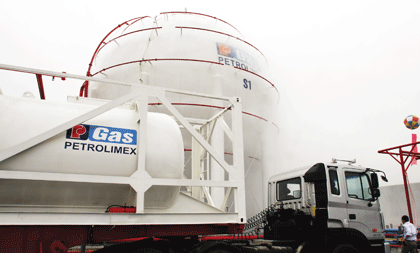SoE equitisation drive ready to hit top gear
 |
| PV Gas will be next to head down the IPO road |
A new decree amending the existing Decree 109/2007/ND-CP on transferring 100 per cent state-owned enterprises (SOEs) into joint stock firms is likely to arrive in the fourth quarter of 2010 and become effective in early 2011, according to State Capital Investment Corporation’s (SCIC) deputy general director Le Song Lai.
The new decree is expected to speed-up state-owned enterprises’ (SoEs) indolent equitisation process. The government planned to equitise some 950 SoEs from 2007-2010. However, only 82 were equitised in 2007, 60 in 2009 and 28 in the first half of 2010, the SCIC reported.
Notably, the draft details rules on the way land use right values are defined, in line with market prices.
Lai said the current regulations had failed to deal with many issues over land valuation and equitised enterprises’ management. “In many cases, land was not properly valued when enterprises’ asset values were calculated, which impacted on their share evaluation during the equitisation process.”
He cited Vietnam Air Petrol Company (Vinapco) as an example as it had a book value of only VND300 billion (around $16 million), which would have ballooned to VND2.5 trillion ($135 million) if land use rights had been taken into account.
The draft also accommodates new rules on strategic investors. Though the number of strategic investors in one enterprise is limited to three at maximum, they will have more pricing options.
Accordingly, in cases where stakes are offered to potential strategic investors after the initial public offering (IPO), the selling price must not be less than the lowest successful IPO bid price.
In cases of negotiation before the IPO, the agreed price must not be lower than the starting price approved by concerned authorities.
As regulated in the existing Decree 109, the price set for strategic investors is only defined after the IPO and should not be less than the average successful IPO price. This rule is a barrier to some big equitised enterprises’ endeavors to find strategic investors as their average winning IPO price is too high as compared with the market share price.
“The new decree, once effective, will create more preferential pricing options for strategic investors,” said Lai, adding that the government would hire international consultants and independent auditors for valuation purposes.
Juerg Vontobel, founder of Vietnam Holding Limited Company, said a certain timeframe was necessary for the government and investors to refresh the country’s equitisation process.
He said: “Most of the current investors in the country are still stuck with their previous investments and trying to find a way out, as the VN-Index has slumped more than 50 per cent from mid-2007. Meanwhile, western investors are still busy in their home countries and other markets after the global financial crisis.”
According to SCIC, as of December 2009, 4,500 SoEs were completely or partially equitised. Most of them are small- and medium-sized enterprises that account for nearly 30 per cent of state capital and assets. Some big SoEs awaiting for equitisation include EVN Telecom, Mobifone, VinaPhone and BIDV.
Big IPOs will help stimulate the market and regain investors’ confidence. Any delays may be misinterpreted as a lack of government determination to accelerate the SoE reform, according to HSBC’s “Vietnam Monitor – Issue 4” released in late 2008.
What the stars mean:
★ Poor ★ ★ Promising ★★★ Good ★★★★ Very good ★★★★★ Exceptional
Related Contents
Latest News
More News
- Cashless payments hit 28 times GDP in 2025 (February 04, 2026 | 18:09)
- SSIAM and DBJ launch Japan Vietnam Capital Fund (February 04, 2026 | 15:57)
- Banks target stronger profits, credit growth in 2026 (February 04, 2026 | 15:43)
- Vietnam on path to investment-grade rating (February 03, 2026 | 13:07)
- Consumer finance sector posts sharp profit growth (February 03, 2026 | 13:05)
- Insurance market building the next chapter of protection (February 02, 2026 | 11:16)
- NAB Innovation Centre underscores Vietnam’s appeal for tech investment (January 30, 2026 | 11:16)
- Vietnam strengthens public debt management with World Bank and IMF (January 30, 2026 | 11:00)
- Corporate bond market poised for stronger growth cycle (January 28, 2026 | 17:13)
- Vietnam's IPO market on recovery trajectory (January 28, 2026 | 17:04)

 Tag:
Tag:




















 Mobile Version
Mobile Version